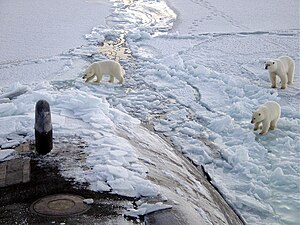 Image via Wikipedia
Image via WikipediaWe need these recommendations now more than ever.
The world’s weather seems to be turning upside down this winter. While communities as far south as Atlanta have been hit by unusually heavy snows, the Arctic Ocean is warmer than it has been in 2,000 years,
according to a new study published in Science. This warming “presumably linked to the Arctic amplification of global warming” the authors write.
Meanwhile, temperatures on land are 15 to 20 degrees above average, and lakes and other waterways have taken longer to freeze—an unwelcome development that interrupts fishing, hunting, and well established trade routes.
These new reports confirm yet again what scientists have been saying for years: climate change is causing alarming disruptions in the great Arctic ecosystem. And since the Arctic helps regulate temperature for the planet, those changes have major implications for all of us. Indeed, many scientists believe our cold winter is directly tied to the Arctic’s warm one.
It is time we factored these new realities into the international community’s approach to the Arctic. Yet few attempts have been made to answer pressing questions, such as how can we preserve polar bears, marine mammals, and other wildlife—along with the people of the North who depend on them—in the face of melting sea ice? How will shipping be managed through the passageways that now appear each summer? And how will we handle new and expanded offshore oil drilling, mining, and fishing in these new circumstances?
The Aspen Commission’s report offers a set of clear, practical recommendations for how we can address these issues and restore an ecosystem that holds back sea-level rise for the entire globe.
I have served on the commission—a partnership between Aspen Institute and the Prince Albert II of Monaco Foundation—for the past three years, and from our first trip sailing through the Arctic Ocean in 2008, we have had the opportunity to see and learn firsthand what climate change is doing to the region. We have spoken to scientists, First Nations leaders, subsistence hunters, fishermen, and representatives from the five Arctic countries, and we have drawn on their experiences to build our recommendations.
First and foremost, we call on Arctic governments to immediately begin developing an Arctic Marine Conservation and Sustainable Development plan by 2012. We also urge the international community to shift away from the current practice of focusing on only one sector at a time, and instead take a comprehensive, ecosystem-based management approach in the Arctic marine environment.
We also recommend that the international community adopt strict uniform standards for industrial fishing, shipping, and offshore gas and oil drilling. All countries, for instance, should refrain from letting their vessels take fish in the high seas of the central Arctic Oceans where no cross-border regional fishing regulations exist. Nations should also develop safeguards for offshore oil and gas development in the Arctic, and put a mandatory polar shipping code in place as soon as possible.
In addition to my work with the Aspen Commission, I also serve on the President Obama’s National Commission on the BP Deepwater Horizon Oil Spill and Offshore Drilling. Both groups came to the independent conclusion that there are enormous gaps in the scientific understanding of the Arctic ecosystem. We can’t yet assess where and when drilling should occur there if we lack elementary baseline data of how the system works. Both commissions call for closing the information gap by fostering more research.
It has been sobering for me to serve on both of these commissions at once. Each one has vividly illustrated for me what our continued dependence on fossil fuels is doing to our planet. It has pushed oil rigs into ever deeper and riskier waters—with disastrous results in the Gulf of Mexico. And it has caused dangerous emissions to alter the earth’s very climate—with impacts reaching as far as the distant North.
Even as the Arctic countries begin to put some safeguards in place for the region, all of us must also reduce our dependence on dirty energy.










